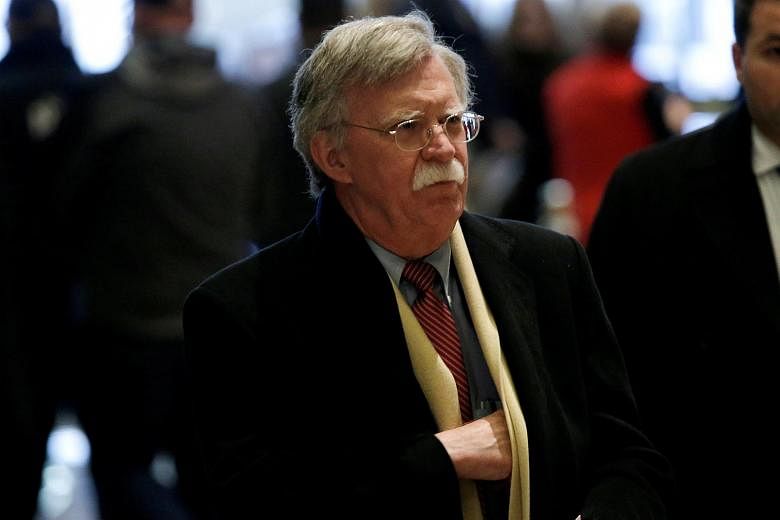WASHINGTON (AFP) - Fifteen years ago this week, the United States launched itself into an ill-fated invasion of Iraq.
On Thursday, President Donald Trump - who now says he opposed that war - appointed one of its most outspoken and unrepentant architects as his national security adviser.
Washington is divided about most things, but on this the pundit class is unanimous: diplomat turned provocateur John Bolton's rise means more unapologetic, unilateral US action.
The 69-year-old's triumphant return would have been bombshell national security news whenever it happened.
But with Trump poised to definitively ditch the Iran nuclear deal and vacillating between courting and threatening the nuclear-armed North Korea regime, it is dynamite.
Some of the generation of so-called neo-conservatives who in 2003 led former president George W. Bush into what, for US troops, are the ongoing wars in Iraq and Afghanistan have gone silent.
Some have publicly changed their minds, or retired or managed to reinvent themselves as a pundit or an analyst with a more nuanced view on the untrammelled use of US power overseas.
Bolton, perhaps alone, kept the faith, consistently arguing for an uncompromising US stance backed by overwhelming force in crisis after crisis in the 12 years since he left office.
Superficially, that ought to have undermined his appeal to Trump, who campaigned on an almost isolationist ticket and insisted he had opposed the Iraq gamble from the outset.
But Bolton has other cards to play that make him much more attractive to this populist and nationalist president.
Bolton has a track record of disdain not just for the foreign policy establishment but for the US diplomats of the State Department and for the rules-based international order.
He was also the US ambassador to the United Nations who spoke out the most starkly against the idea that international laws, norms and agreements should bind the United States.
In two weeks, when he joins the White House to replace warrior scholar General HR McMaster as Trump's top security adviser, Bolton will have another chance to make US policy.
This means that on May 12, three days after Bolton takes office, Trump will probably abandon the 2015 Iran nuclear deal - a keystone in international non-proliferation efforts.
It also probably means that if Trump's quixotic attempt to arrange a nuclear disarmament summit with Kim Jong-Un fails, then the world is closer to the brink of all-out conflict.
"Those content with living with a nuclear North Korea have argued that it can be contained and deterred like the Soviet Union during the Cold War," Bolton tweeted recently.
"This assessment is deeply flawed," he warned.
And the United Nations, where officials still shudder at Bolton's memory, can expect to see its funding cut and its resolutions ignored by a scornful US administration.
One group of Trump critics, at least, may be reassured. Those who say Trump, for whatever reason, is too soft on Russia's President Vladimir Putin will have an ally.
While his new boss Trump was on the phone to the Kremlin to congratulate Putin on this week's "election victory", Bolton was dismissive.
"The recent Russian presidential election was a chance for Putin to practice election meddling on his own elections so he can do it better elsewhere," Bolton warned.
"We need a long-term strategy to deal with countries like Russia and China with long standing rulers." If he gets the chance to help craft that strategy, Bolton's long but determined wait railing in the wilderness of conservative think tanks and Fox News will not have been in vain.

